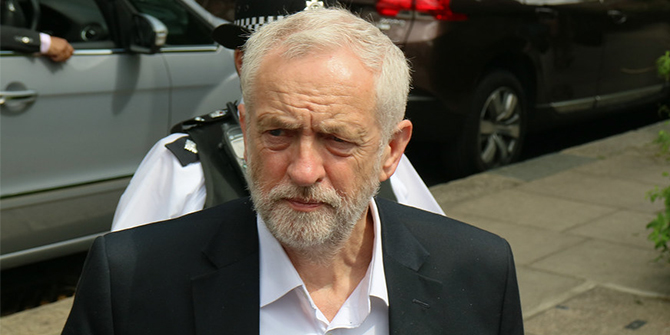 Many have been critical of Ed Miliband’s conference speech for not mentioning the deficit. But Labour has promised more or less the same austerity for the next five years in an attempt to earn ‘credibility’. Eunice Goes gives her take of the party’s conference this week, writing that Labour can’t have it both ways; those who doubt Labour’s ‘credibility’ will remain unpersuaded by the party’s ambivalent embrace of austerity, and those who were expecting some jam tomorrow may look elsewhere.
Many have been critical of Ed Miliband’s conference speech for not mentioning the deficit. But Labour has promised more or less the same austerity for the next five years in an attempt to earn ‘credibility’. Eunice Goes gives her take of the party’s conference this week, writing that Labour can’t have it both ways; those who doubt Labour’s ‘credibility’ will remain unpersuaded by the party’s ambivalent embrace of austerity, and those who were expecting some jam tomorrow may look elsewhere.
With eight months to go before the 2015 general election and with only an anaemic lead in the opinion polls, the leadership of the Labour Party decided to leave radicalism aside and invest all the family silver in the Holy Grail of electoral politics: ‘credibility’ shares. Labour is convinced that it cannot win next year’s elections if it does not offer voters a ‘credible’ approach to the economy. But ‘credibility’ is a liquid concept. It is totally dependent on what the conventional wisdom of the day defines as credible. At the moment that conventional wisdom – shouted daily by media columnists, business people, the City, electoral strategists and pollsters – dictates that in order to gain credibility Labour has to copy the coalition’s deficit reduction strategy of painful public spending cuts. Nothing else will do.
It does not really matter that this recipe has not reduced the public deficit or kept public finances under control either in Britain or in the Eurozone countries. What matters is that Labour vows to pursue ‘fiscal responsibility in the national interest’ and seems to be (different from actually being) responsible and credible. The problem is that the current Labour leadership does not seem to believe in this strategy. In his earlier, more radical days, Ed Miliband opposed austerity as an ineffective solution to Britain’s deficit crisis. Ed Balls was equally vociferous in his attack of the coalition’s deficit reduction strategy. But now both Eds and the rest of the frontbench simply go through the motions of demonstrating economic credibility through austerity.
A few days ago, Miliband showed his ambivalence about austerity when he forgot to mention the ‘deficit’ section of his conference speech. When he was asked about his Freudian slip he gave a revealing answer: ‘the deficit is important, but it is not the only thing that matters’. But if the Labour leader says that the deficit is not the only thing that matters, for the Labour delegates that filled the conference hall in Manchester, and perhaps also for Josephine, Xiomara, Gareth and all the other real people Miliband mentioned in his speech, it sounded pretty much that tackling the deficit is the party’s priority. For all the empathetic utterances about the sacrifices made by hard-working people who are paying higher taxes and higher energy bills, Labour promised more or less the same austerity for the next five years with just a generous dose of ‘togetherness’.
Ed Balls was crystal clear about that. A Labour government will ‘balance the books’, will not reverse the coalition’s public spending cuts or increase public borrowing to fund capital investments. To make sure that everyone – and in particular those who define the conventional wisdom – got the message, he repeated the words ‘tough’ and ‘iron discipline’ several times.
To sweeten this bitter pill, Miliband gave the necessary but astute (Labour has an advantage over the Conservatives in this policy area) assurances about the NHS with promises of new money which will be raised via new taxes on bankers and their mansions, on the tobacco companies, and by making sure that hedge-fund managers pay their fair due in taxes. He also promised to raise the minimum wage by £1.50 to £8.00 per hour but only by 2020. Even the governor of the Bank of England, Mark Carney, expects a more rapid movement on wages. Earlier this month, Carney told the TUC conference that workers ‘deserved’ better pay.
Miliband offered as well a progressive vision for the future, clearly explained in a six-point plan. But this plan will only be implemented from 2020, that is, when Labour has hopefully proven that it is a ‘credible’ and ‘responsible’ manager of the economy. So far, so New Labour. But are voters ready to wait another five years for some improvement to their lives? Even in the glory days of New Labour voters became impatient with Gordon Brown’s ‘prudence for a purpose’ and demanded investments in the public services.
In medieval times, Catholic priests kept the faithful in the straight and narrow by telling them that their penances and sacrifices would be rewarded with a place in Heaven. In the last few days, Labour seems to have endorsed a similar approach to the elections. The trouble is, it does not really work in modern politics. Five years is the equivalent of eternity. Those voters who doubt Labour’s ‘credibility’ will remain unpersuaded by the party’s ambivalent embrace of austerity, and those who were expecting some jam tomorrow (and not by 2020) will probably look elsewhere.
Note: This article gives the views of the author, and not the position of the British Politics and Policy blog, nor of the London School of Economics. Please read our comments policy before posting. Featured image credit: Ed Miliband CC BY 2.0
 Eunice Goes is an Associate Professor at Richmond University. Her research looks at political parties and ideologies and she is writing a book on the Labour Party under Ed Miliband. She tweets from @eugoes
Eunice Goes is an Associate Professor at Richmond University. Her research looks at political parties and ideologies and she is writing a book on the Labour Party under Ed Miliband. She tweets from @eugoes







